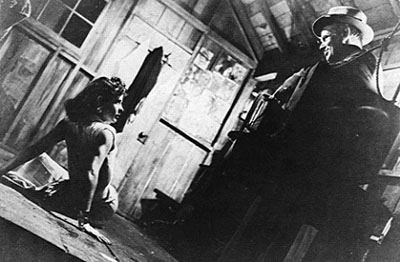This double-complicated exposition opens up the text's two quests and the film's dual point-of-view. Candy has no idea that she's in league with communists or that she poses a threat to national security. Her ignorance is revealed through Fuller's eyeline matches. The feds, on the subway, continually look at each other and at her; she, unaware of their presence, doesn't return their gaze. Afterall, her former lover, Joey, has told her that he's involved in the manufacturing business and she's carrying industry-related information. Later, at Joey's apartment, she acquires knowledge. As she paces, Fuller juxtaposes her movement with the languid torpor of Joey and his comrades, smoking cigars and sitting stiffly. "You know what's crazy about the whole thing? You know what he wants? $25,000? . . . You know why? You know what he said? He's crazy. He said I was a commie. What makes people like that?" Her rapid movements suggest freedom from their values, while her questioning words, indicate incredulity. But when she's suddenly told to sit down by a thin-faced aesthete holding a cigarette holder, she performs a series of her own rapid eyeline matches and realizes Skip's truth. She is in league with "commies."
Skip might have spoken the truth, but he, too is a threat to national security. In '50s-noir fashion, he's another ambiguous hero, cut-off from respectability and institutions. Widmark's version of world weariness is willing to sell out his country for big bucks. When picked up at his South Street shack and brought in by the feds, he refuses to get the kink out of his mouth and cooperate. "Are you waving the flag at me?" Widmark says. In a medium close-up, he smirks, "Is there a law now that I gotta listen to lectures?" with a Sinatra inflection. The feds appeal to his patriotism. "Do you know what treason means?" "Who cares?" says the jaded hero, a two-time loser who fears getting slapped with a third. Fuller's McCoy is a city soldier: patriotism and the flag are no longer relevant--survival is.
In several noirs, Phantom Lady (1944), Dark Corner (1946), Kansas City Confidential (1952) and 99 River Street (1953) a somewhat innocent man gets caught in a dizzying world of murder and intrigue. This isn't Fuller's universe. Instead, following on his wartime experiences and the realities of Dachau, Fuller's world view is one of irrational chaos--we're all guilty and responsible. McCoy is an outsider and a criminal, but he is society's hope to beat a totalitarian threat to democracy. His quest, therefore, becomes one of recovery, being reclaimed by society through the love of two women, Candy and Mo.
But Skip doesn't trust Candy. He doesn't believe that she didn't know about the microfilm and he treats her like a femme-fatale, roughing her up, pouring beer on her, and always looking for duplicitous motives. Skip's friend Mo, played by Thelma Ritter with her usual disarming frankness, is the central figure, the bridge connecting the two points-of-view. Candy visits Mo when she fears for Skip's life, and then Mo visits Skip at a lakeshore diner. "Stay away from your shack, Skip. There's a guy gunning for ya," she says, and then she critiques her friend's motives, "What's a matter with you? Playing footsie with the commies." Skip is nonplussed. "You waving the flag, too?" But Mo doesn't let up. She links Skip with Candy, "That muffin you grifted. She's okay," and reclaims him for society, "Stop using your hands, Skip, and start using your head. The kid loves you."
Mo dies for her beliefs and Skip, like a series of other noir heroes--Victor Mature in Kiss of Death (1947), John Garfield in Force of Evil (1948) and Glen Ford in The Big Heat (1953)--seeks to affirm value, faith and hope in the face of darkness. In a poignant moment, Skip reclaims Mo's body from a tugboat, readying to take her in box 11 to potter's field. "Relative?" the captain asks. "Nope," Skip says with Hemingway terseness. "I'm going to bury her." This act of feeling opens the narrative for his epiphany.
When Skip visits Candy at the hospital, he acquires full knowledge of her truth. Previously, she had smacked him on the head, stolen the microfilm and returned it to the feds in the hope of bringing Skip back into the community. She had told the police it was Skip's idea, and they had suggested that she return to her apartment with the film, in order to lay a trap for Joey and the communist cell. But when Joey discovers that one of the frames is missing, he brutally beats her across the apartment, breaking lamps, picture frames and tables before shooting her. At the hospital, Skip asks the battered Candy, "You all right?" As he speaks, Fuller, in an amazing cheat shot from behind Peters, frames Widmark through the bars of the headboard. This flamboyant shot strongly suggests both Widmark's dubiousness and lack of faith. Candy justifies her actions, "I'd rather have a live pickpocket, than a dead traitor," and Widmark, still framed by bars, silently spits, "And I'd rather have you talk without a twist." But when she confesses that Joey kicked her face in "Because I wouldn't tell him where you lived," the bars disappear. Suddenly Widmark, in an unobstructed close-up, has found trust and faith. He kisses her, and Fuller's opening exposition of narrative collision is closed.


